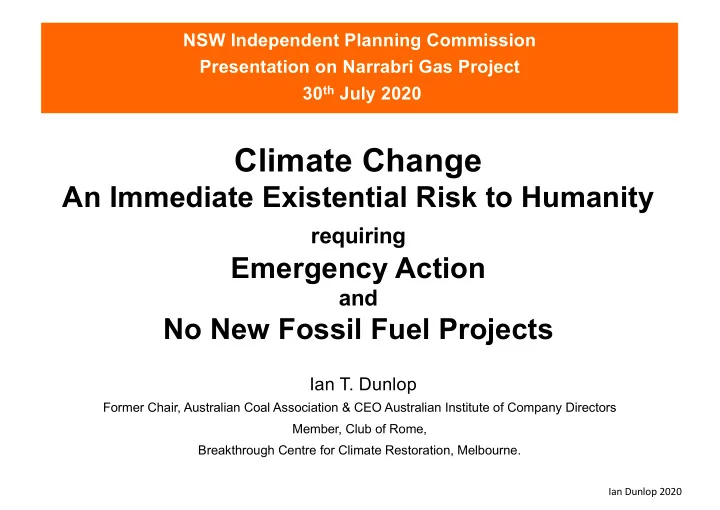

NSW Independent Planning Commission Presentation on Narrabri Gas Project 30 th July 2020 Climate Change An Immediate Existential Risk to Humanity requiring Emergency Action and No New Fossil Fuel Projects Ian T. Dunlop Former Chair, Australian Coal Association & CEO Australian Institute of Company Directors Member, Club of Rome, Breakthrough Centre for Climate Restoration, Melbourne. Ian Dunlop 2020
CLIMATE CHANGE POLICY Paris Climate Agreement Limit temperature Business as usual To achieve increase to “well 2 0 C – 66% below 2 0 C above pre-industrial chance levels and to Paris commitments pursue efforts to limit the increase to 1.5 0 C” A yawning chasm between Paris rhetoric and reality From: emissions up to emissions down is the greatest emergency humanity has ever faced Figueres et al (2017) , “Three years to safeguard our climate”, Nature 546:593-5 Ian Dunlop 2020
CLIMATE CHANGE POLICY On track to an existential crisis “Incompatible with organised global community” “Outright chaos” “Extremely dangerous” boundary Arctic sea ice & West Antarctic ice tipping points Ian Dunlop/David Spratt 2019 Ian Dunlop 2020
CLIMATE CHANGE A 1.5 0 C temperature increase is now inevitable by 2030 Irrespective of any action taken globally Ian Dunlop 2020
RISK IMPLICATIONS IF CURRENT INACTION CONTINUES A 3 0 C 2050 Scenario Ecosystem collapse • – Coral reefs – Amazon rainforest – Arctic Deadly heat > 100 days p.a.& extreme flooding in • many regions • Rising sea levels > 0.5 m Many nations & regions become uninhabitable • 1 billion people displaced • Significant drop in crop yields and food production • Lower reaches of Mekong, Ganges & Nile rivers • inundated • Significant sectors of major cities abandoned – Chennai, Mumbai, Jakarta, Guangzhou, Tianjin, Hong Kong, Shanghai, Manila, Bangkok, Lagos. “Hothouse Earth” triggered • Source: Breakthrough: https://www.breakthroughonline.org.au/papers Ian Dunlop 2020
RISK To stay below the Paris limits - with IPCC 50% chance of success for 1.5°C , or 66% for 2°C no new fossil fuel projects can be built • managed decline of existing fossil fuel industry • Global Emissions Global Fossil Fuel For 90% chance of success no carbon budget, even for 2 o C Source: “Drilling Toward Disaster”, Oil Change International, January 2019 Ian Dunlop 2020
RISK Potential Climate Tipping Points Evidence suggests positive feedback loops Pandemics from zoonotic diseases are climate-related and may already be triggering some another potential tipping point tipping points. This is not quantified in current IPCC Reports 7 Ian Dunlop 2020 Source: Schellnhuber, after Lenton et al, PNAS, 2008
RISK Potential Tipping Point Cascades The triggering of one tipping point may lead to an irreversible, cascading sequence developing globally. Recent unprecedented Australian bushfires may be an early indication that is starting to happen locally 8 Ian Dunlop 2020 Source: Steffen et al, PNAS, 2018
RISK Climate Tipping Points – too risky to bet against “The evidence from tipping points alone suggests that we are in a state of planetary emergency: both the risk and the urgency are acute. International The intervention time to prevent tipping could action must already have shrunk toward zero, whereas the reflect this reaction time to achieve net-zero emissions is 30 years at best. Hence we might have already lost control of whether tipping happens.” The stability and resilience of our planet is in peril Source: “Climate Tipping Points – too risky to bet against”, Rockstrom, Steffen,Schellnhuber et al, Nature Nov 2019 Ian Dunlop 2020
RISK Why is the risk existential? Dangerous climate change is occurring at the 1 0 C temperature increase already experienced. • To stay below 2°C, global emissions must peak by 2020 , then reduce rapidly. 1.5°C implies even • more rapid reduction. But emissions still rise in line with worst case scenarios. Carbon budget probabilities to achieve 2°C are unrealistic. 50 to 66% chances are not good odds • A posing permanent large negative consequences to humanity which can never be for the future of humanity. At 90%, there is no carbon budget left today. undone. Climate inertia means that ongoing fossil fuel investment locks-in irreversible, climatic • outcomes, triggering tipping points. By the time this becomes clear, it will be too late for avoiding action Atmospheric aerosols produced by burning coal and oil are cooling the planet by 0.3 - 0.5 0 C. As • these concentrations reduce with phase-out of fossil fuels, a commensurate increase in temperature is likely, compounding the problem of staying below warming limits. Paris solutions rely on negative emission technologies to remove carbon from the atmosphere. • These technologies are non-existent at scale today. Depending upon them creates a false sense of security, of easy solutions when none exist. Ian Dunlop 2020
RISK Why is the risk immediate? • We have no carbon budget left for any realistic chance (90%) of staying below 2 0 C That time • Our actions today are locking-in is now! irreversible, existential, outcomes • Sensible risk-management addresses risk in time to prevent it happening Emergency Action is essential Ian Dunlop 2020
Solutions A Fossil Fuel Free Future Gas never has been a realistic transition fuel The world cannot commit to any new fossil fuel projects if catastrophic outcomes are to be avoided The Narrabri Project is incompatible with Santos’s own Climate Thank Change Policy of limiting temperature rise to less than 2 o C you and with Australia’s signature of the Paris Climate Agreement More economic and sustainable renewable energy, energy efficiency and conservation alternatives are available, with greater regional benefits & employment The Narrabri Project must not proceed Ian Dunlop 2020
References Available at: http://www.clubofrome.net Ian Dunlop 2020
References Available at: https://www.breakthroughonline.org.au/publications Also http://itdunlop.com Ian Dunlop 2020
Recommend
More recommend